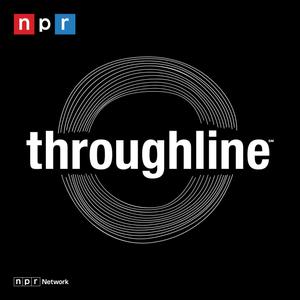
The Gun Machine
WBUR
Stare down the barrel of America’s most controversial, protected and lethal industry: guns. Find out how America was forged by the gun industry on this new podcast series from WBUR & The Trace, The Gun Machine. You're listening to The Gun Machine in Short Run—the best long-form audio series from WBUR, Boston's NPR, all in one feed.
- 45 minutes 3 secondsIntroducing a new miniseries from The Globe: "The Curse Breakers"
This new miniseries, The Curse Breakers, tells the incredible story of how 20 years ago, the 2004 Boston Red Sox finally overcame the so-called ‘Curse of the Bambino’, shaking off 86 years of bad luck, to finally win the World Series championship.
Even if you’re not a die-hard baseball fan, this story is about more than just the game—it’s about resilience, hope and what it means to believe in something bigger than yourself. So get ready to relive the moments that redefined what it means to be a Red Sox fan.
You can find the episodes of this miniseries in The Globe, a new podcast feed where you can listen to excellent audio features from The Boston Globe.
If you like what you hear, check out The Globe podcast wherever you get you podcasts or visit globe.com/globepodcast.
18 October 2024, 11:00 am - 12 minutes 5 secondsReverse Course: This machine creates drinking water ‘from thin air’ in driest parts of the world
People are taking steps big and small to move the dial on climate change. This week, in Here & Now's Reverse Course series, senior editor Peter O’Dowd and producer Chris Bentley take listeners across the country for a closer look at projects designed to make an impact.
This episode looks at water conservation in the Navajo Nation. Up to 30% of the homes on the Navajo Nation still go without running water. But there’s new hope for many of these arid communities. They’re using solar-powered machines to pull moisture straight out of the air. Each one creates more than a gallon of fresh drinking water every day.
Dive deeper into this episode here.
Find out more about the Reverse Course series and listen to the previous nine episodes here.
29 April 2024, 8:00 pm - 10 minutes 38 secondsReverse Course: Detroit debuts 'road of the future' with wireless EV charging
People are taking steps big and small to move the dial on climate change. This week, in Here & Now's Reverse Course series, senior editor Peter O’Dowd and producer Chris Bentley take listeners across the country for a closer look at projects designed to make an impact.
This episode looks at wireless electric vehicle charging. Detroit is testing a new way to charge electric vehicles that doesn’t require plugging in: Just park or drive your car on the right strip of road and watch the battery meter tick up.
Dive deeper into this episode here.
Find out more about the Reverse Course series and listen to the previous nine episodes here.
25 April 2024, 9:00 pm - 10 minutes 47 secondsReverse Course: Shipbuilders harness the wind to clean up global shipping
People are taking steps big and small to move the dial on climate change. This week, in Here & Now's Reverse Course series, senior editor Peter O’Dowd and producer Chris Bentley take listeners across the country for a closer look at projects designed to make an impact.
This episode looks at shipping goods by sea on large container ships, which creates about 3% of the world's greenhouse gas emissions each year. In pursuit of a cleaner alternative, some companies are using wind power to move cargo.
Dive deeper into this episode here.
Find out more about the Reverse Course series and listen to the previous nine episodes here.
24 April 2024, 8:18 pm - 11 minutes 53 secondsReverse Course: Planes pollute the planet, but new technology could clean up the aviation industry
People are taking steps big and small to move the dial on climate change. This week, in Here & Now's Reverse Course series, senior editor Peter O’Dowd and producer Chris Bentley take listeners across the country for a closer look at projects designed to make an impact.
This episode looks at big commercial airliners, some of the fastest-growing sources of climate-warming pollution on the planet. Scientists and entrepreneurs are trying to solve that problem with sustainable aviation fuels, such as electric batteries and hydrogen.
Dive deeper into this episode here.
Find out more about the Reverse Course series and listen to the previous nine episodes here.
23 April 2024, 10:00 pm - 12 minutes 2 secondsReverse Course: Battery-powered big rigs could haul the future of trucking
Short Run presents Here & Now's climate series "Reverse Course".
Today's episode is about how the trucking industry is responsible for almost a quarter of all American greenhouse gas emissions in the transportation sector. But roadblocks remain to going green.
Take a deep dive on this story here.
Find out more about the Reverse Course series and listen to the previous eight episodes here.
22 April 2024, 8:42 pm - 25 minutes 24 secondsThe Gun Machine presents: "Beyond All Repair," a new murder mystery podcast
Introducing Beyond All Repair, a new WBUR podcast from producer emeritus of Dear Sugars, Amory Sivertson. This series tells the story of a murder, but also the woman who was accused of that murder, Sophia.
Sophia was newly married and 6 months pregnant when she was charged with murdering her mother-in-law in 2002. She gave birth to a son in jail that she hasn’t seen since, and for the last three years, she’s been telling me her story in hopes of getting justice for her mother-in-law, of having a chance of meeting her son, and of finally being believed.
This is the first chapter of Beyond All Repair. Episode 2 is already waiting for you. Listen on Apple Podcasts, Spotify or wherever you get your podcasts.
14 March 2024, 10:00 am - 3 minutes 3 secondsShort Run: Introducing "Elements of Energy" from WBUR's On Point
On Point's special series 'Elements of energy: Mining for a green future,' explores the environmental and human cost of mining, and asks what it would take for the U.S. to meet the Biden administration's green energy goals.
Listen to this series by following On Point on Apple Podcasts, Spotify or wherever you get your podcasts.
11 March 2024, 2:00 pm - 40 minutes 44 secondsThe Gun Machine Ep 8: "The Leftovers"
Growing up, host Alain Stephens bonded with his dad over guns — an interest Alain still holds today. But more than a decade ago, his family experienced a terrible loss.
In this episode, Alain examines how that loss has shaped his career — and what it means for the gun industry to be inextricable from the American government, and for many, American identity. With more than 100 Americans dying from shootings every day, how do we begin to calculate the cost of our country's current relationship with guns?
22 November 2023, 6:00 am - 45 minutes 23 secondsThe Gun Machine Ep 7: "What the ATF"
The Bureau of Alcohol, Tobacco, Firearms and Explosives is supposed to regulate the gun industry and protect the American public from gun crime. But the ATF often falls short of that mandate. This is no accident.
This episode of The Gun Machine draws on host Alain Stephens’ seven years of reporting on the ATF to chronicle how the gun lobby and its Congressional allies worked to limit the agency’s enforcement powers and resources.
Stephens speaks to Steve Dettelbach — the ATF’s first permanent director in seven years — about the challenges agents face trying to do their jobs. Stephens also talks to retired ATF agent David Chipman about how controversial episodes like the Ruby Ridge standoff and the Waco siege turned public opinion against the agency, paving the way for budget cuts and legislative restrictions.
8 November 2023, 6:00 am - 44 minutes 18 secondsThe Gun Machine Ep 6: "The Church"
In 1999, at the end of a decade in which Gary, Indiana, had endured being labeled as the “murder capital of the nation,” then-Mayor Scott King filed a suit against gun manufacturers he believed were knowingly flooding his city with illegal guns. But soon, the NRA would help ensure that such lawsuits were nearly impossible.
1 November 2023, 6:00 am - More Episodes? Get the App
Your feedback is valuable to us. Should you encounter any bugs, glitches, lack of functionality or other problems, please email us on [email protected] or join Moon.FM Telegram Group where you can talk directly to the dev team who are happy to answer any queries.
 On Point | Podcast
On Point | Podcast
 Throughline
Throughline
 SOLD OUT: Rethinking Housing in America
SOLD OUT: Rethinking Housing in America
 The Big Dig
The Big Dig
 Fresh Air
Fresh Air
 Reveal
Reveal